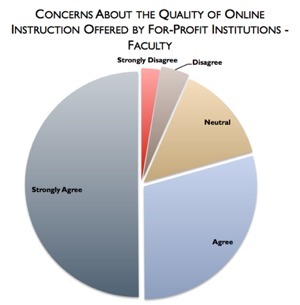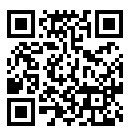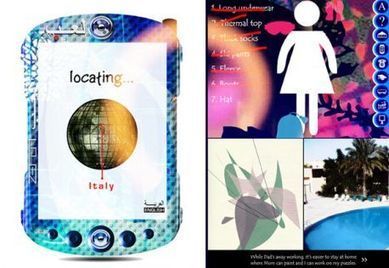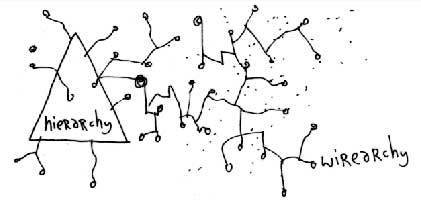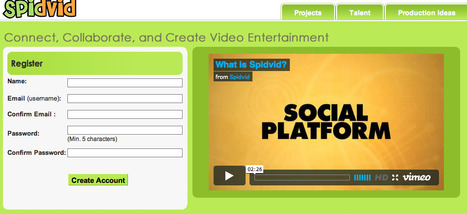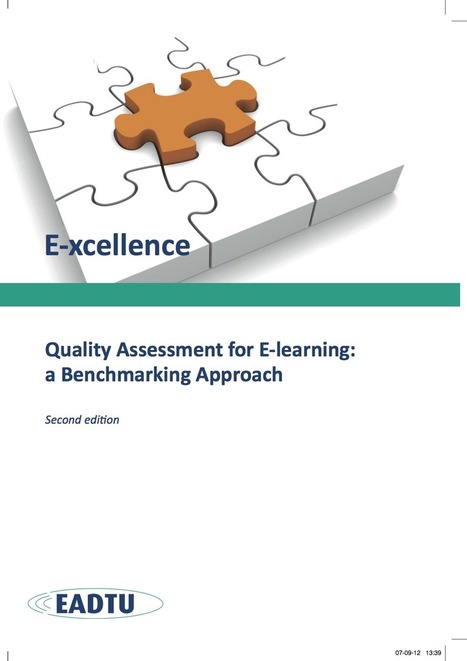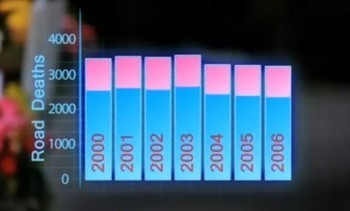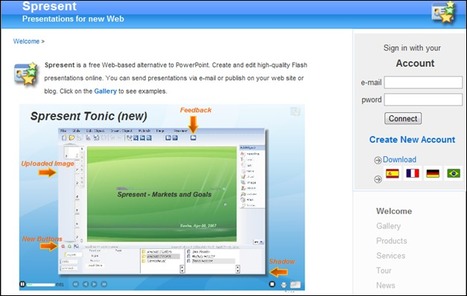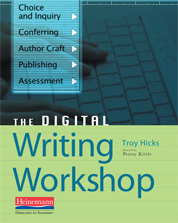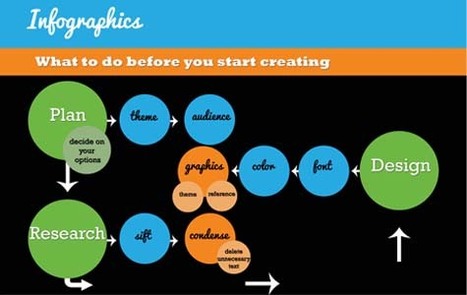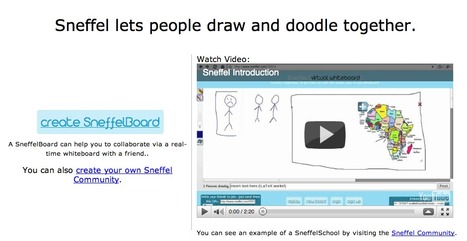
|
Rescooped by Susan Myburgh from 21st Century skills of critical and creative thinking |
Get Started for FREE
Sign up with Facebook Sign up with X
I don't have a Facebook or a X account

| Tags |
|---|
 Your new post is loading... Your new post is loading...
 Your new post is loading... Your new post is loading...
No comment yet.
Sign up to comment
Conference “New Media: Changing Media Landscapes” - St. Via Sandrine Joly, juandoming, Lynnette Van Dyke
The latest version of Evernote for Mac brings changes to the interface as well as new options for searching and sharing one’s notes. (Evernote vypadá hodně dobře, že bych mu dal ještě šanci?
Employers today are looking for college graduates who are information savvy. Searching for and finding information is only half the equation. Employers also expect their employees to be able to extrapolate information and evaluate their findings. Via Tim Scholze
Three important takeaways about the current state of this growing trend. Fifty-eight percent of faculty surveyed feel pessimistic about online education. Administrators, on the other hand, are overwhelmingly excited about teaching students over the Internet, with more than 80 percent indicating their optimism. It’s easy to see why: Online education programs are a revenue stream for cash-strapped schools. At the same time, they redefine the professor’s role in a way that may be difficult for some teachers to accept.
They are chairing a workshop on social media, young people and freedom of expression and developed a survey for young people age 11-18, to enable them to include the thoughts and ideas of young people from across the world in their workshop. Via Lynnette Van Dyke
"The fight over MOOCs isn’t about the value of college; a good chunk of the four thousand institutions you haven’t heard of provide an expensive but mediocre education."
Comments: longish piece but a very good read. Bottom line: make sure universities and colleges don't go the way the music industry went when they saw mp3 coming and yet choose to ignore it. MOOCs are a serious threat (and opportunity).
Clay Shirky starts with the mp3 story and Napster, then introduces MOOCs as a similar phenomenon. They are similar in that they also beat the 'cost disease': education doesn't scale well, thus becoming ever more expensive relative to products and services that do scale (anything that can be mass produced, cars, computers, but not musical performances). He then goes on to point out that the Harvards of this world have deep enough pockets to be safe. Indeed, for them MOOCs are a marketing instrument. The institutions that should be worried are the non-ivy-league universities, some of which apparantly are better at producing loan defaults than graduates. Even qualitywise, not just in terms of price, MOOCs might offer a beter educational experience than these instutions. And he concludes by saying that "In the academy, we lecture other people every day about learning from history. Now its our turn, and the risk is that we’ll be the last to know that the world has changed, because we can’t imagine—really cannot imagine—that story we tell ourselves about ourselves could start to fail. Even when it’s true. Especially when it’s true." (peter sloep, @pbsloep; thanks Seb Schmoller for alerting me to this) Via Peter B. Sloep 
Peter B. Sloep's comment,
November 14, 2012 4:52 AM
Found it good article too. The situation in the US is much worse than I suspected. Actually, MOOCs start to make sense then. That also points to the weaker part of the article. Although we should of course learn from the past, what is the lesson to be learnt? Shirky suggests to avoid MOOCs, but may be we only need to make sure they are not run by venture capital.

Peter B. Sloep's comment,
November 14, 2012 4:30 PM
@plerudulier I agree, there are similarities. If you want to explore what the open source movement could have to offer to open content, read Steven Weber's the success of open source. Although it is only about open source, it has got many valuable lessons.
Set in the early 21st century and told through text, sound, images, music and games, ‘Inanimate Alice’
[An in-depth look at the making of this fabulous project.] Via The Digital Rocking Chair, Katie Frank, Lynnette Van Dyke
A list of the top 101 websites for English & Language Arts (ELA) chosen by real teachers from prominent LinkedIn groups. Via Steven Engravalle, Lori Johnson, Jim Lerman, Katie Frank, Lynnette Van Dyke
"EPIC 2020, stands for the proposition that the education of the world will change dramatically for the better during this decade. The two movies that follow and this site hope to provide tools that shatter the paradigm that the future will be anything like the past as well as facilitate discussion and accelerate actions to bring about the transformation of the education of the world."
Comment: published in May this year but missed by me then, the 10 minute video narrative starts by saying that the in the year 2020 most colleges and universities no longer exist. A story unfolds that begins with the success of the Khan Academy and Udacity, that predicts a merger between Apple buyes Amazon ('AppleZone') to boost the iTunesU, to which Google reacts with providing access to services that 'know what you know' and on the basis thereof 'predict what you need to know". In 2020 this revolution - the domination of global education by Apple and Google is complete, all universities and colleges have gone, except for those who cater for the rich and compete on the quality of food and leisure they provide. Watch it, your 10 minutes are well spent! (peter sloep, @pbsloep) Via Peter B. Sloep 
Peter B. Sloep's comment,
November 11, 2012 1:21 AM
No, not really, but I am not sure either. Note that the commoditization of education is something that appeals to venture capitalists, see their funding of MOOC providers Udacity, Coursera. Also LMS providers (Blackboard) don't want to miss this boat. And then the parallel with the music, film and book industries is forceful, even though they rely much less on interaction than education does. Finally, note that Apple (iTunesU) Google (their MOOC platform, forgot the name) are already involved. Let's put it this way, if universities are in financial trouble because of dwindling funding through governments and private capital with deep pockets gets involved. Is their a way they can be stopped?

plerudulier's comment November 11, 2012 4:31 AM
I'm been thinking about that myself especially after realizing that many of those MOOC evangelists were actually teachers themselves. Although I perfectly understand the interest for students wannabes to get access to education no matter their financial contraints as well the willingness of some teachers to share with as many as possible i couldn't help thinking that by doing so the latter were, in a way, sawing off the branch they sit on.

Peter B. Sloep's comment,
November 11, 2012 6:04 AM
Sawing of the branch: yes, that is a recurring theme in the posts that scoop.it collects for me. Also, just today I read a story about a student who echoed what you say: what are you nagging about, this is a wonderful opportunity for students (although she acknowledges that it is not without dangers; see http://tiny.cc/povlnw
We all know and understand hierarchy - the enduring principle of the institutions that govern us and in which we work and live. The Internet is connecting customers, employees and communities and empowering them with information in ways never before possible. Taking decisions and managing organized activities are being impacted in powerful ways by interconnected networks of people and technology. The impacts we're experiencing are creating new dynamics in organizations as well as emergent forms of organized activities that are based on participation and peer-to-peer interaction. As people get used to operating in these new conditions, often (but not always) the results are nimble, responsive, and results-focused networked groups and teams. The new interconnected environment demands new principles for organizing collaborative activity. Traditional hierarchy does not lead and support networked activity as well as newer forms and principles. And ... over the last ten years, it has become quite clear that the impacts of these living social networks will only grow, both in depth and reach. |
This synopsis of Graham and Hebert's meta-analysis presents an overview of their findings and describes implications for practice. It is intended to serve as a first step that will encourage further exploration of the "Writing to Read" document. The authors describe a range of instructional practices that have demonstrated a positive effect on reading outcomes and provide guidance on how teachers can use writing instruction to strengthen students' reading performance. The full report can be accessed here. The Center on Instruction hosted a webinar on April 21, 2011, featuring Dr. Steve Graham, co-author of "Writing to Read". He presented an overview of the findings and described implications for practice. He also provided specific examples of how writing facilitates reading and reading development. The archived WebEx file can be accessed here. The PowerPoint presentation used during the webinar is available for download here. These resources provide support in the alignment of instruction in schools that are implementing School Improvement Grants (SIG) and/or College and Career Ready Standards (including Common Core State Standards). http://www.centeroninstruction.org/files/Synopsis%20Writing%20to%20Read.pdf Via Lynnette Van Dyke
Teaching kids goes beyond textbooks and classroom lessons. It has to include teaching them to open their minds and how to think for themselves.
Read more, a MUST: http://edudemic.com/2012/11/next-generation-of-thinkers/
Via Gust MEES
Help Chris Brown promote creativity and positivity around the world with his Symphonic Love Giving Assistant (#TEAMBREEZY! Help Chris Brown promote creativity & positivity around the world w/ his Symphonic Love Giving Assistant!
Measuring Quality Assurance in #eLearning through 33 indicators http://t.co/rL0rf1UY #QA... Via Fiona Harvey, Lynnette Van Dyke
Visual Loop's selection of keynotes, TED Talks, and interviews by some of the top names in the field:
From Visualoop.com: After the success of our collection of data visualization presentations a few weeks ago, we decided to push even further our research of multimedia resources and take the risk of selecting some videos. And we say risk, because the abundance of data visualization videos on the Internet is simply mind-blowing. Just think about it: How many events are there about information visualization? Dozens, maybe hundreds every year. Then, add the documentaries, interviews and educational videos, and soon you’ll realize, like we did, that this list could easily be up to one hundred or more. That means that a lot of good stuff was left behind, so apologies for that – but feel free to leave your recommendations in the comments section. Also, please note that some of these videos are over one hour long.Via Lauren Moss
Your goal is to create eLearning courses that will get learners engaged. How you manage content determines whether you effectively communicate. Via callooh, Tim Scholze, Lynnette Van Dyke
Online presentations are considered as a really effective marketing and communication tool. Via Kathleen Cercone, Lee Webster, Lynnette Van Dyke
From
ht
Let’s be honest, we don’t like to read big pieces of text. Text-heavy graphs are rather difficult for understanding, especially when dealing with numbers and statistics. That is why illustrations and flowcharts are often used for such kind of information. An infographic, or a visual representation of study or data, like anything else, can be done right or wrong. How to create a successful infographic? A good idea and a good design.
Stop by the link for more on what defines an infographic, what contributes to its popularity, as well as the various types of infographics and references for tutorials and best practices.
Additional topics covered include: The major parts of an infographic How to create an infographic Developing ideas & organizing data Research & sources Typography, graphics & color Facts & conclusions Designing & Editing Via Lauren Moss, Monique Walhof, THE OFFICIAL ANDREASCY, Jimi Paradise, Alazne González, Rui Guimarães Lima, Lynnette Van Dyke
Your goal is to create eLearning courses that will get learners engaged. How you manage content determines whether you effectively communicate. Via callooh, Tim Scholze, Lynnette Van Dyke
Global Digital Citizenship is a critical element of any teaching program at any level. Our students are connected. Irrespective of the age of the student, they are wired. We are seeing devices reducing in cost, increasing in availability, and entering most classrooms and almost every school.
If you ask students a question, their first response is likely to be to “Google” it. If you go to a library for research, the students are most likely to use the computers......
Sneffel is a beta web app that changes online education through real time collaboration. Via Ana Cristina Pratas |







